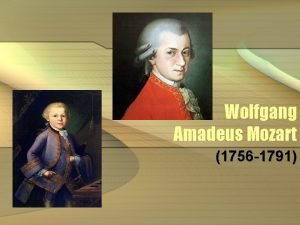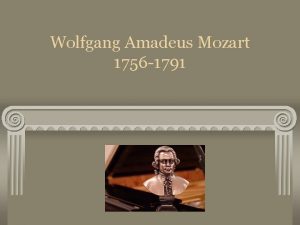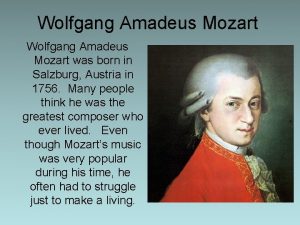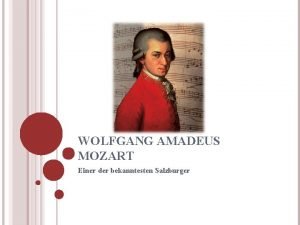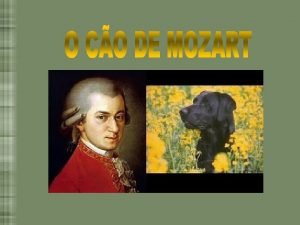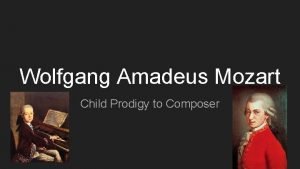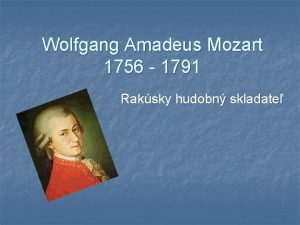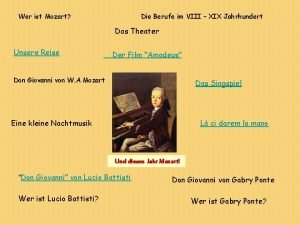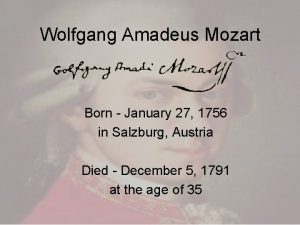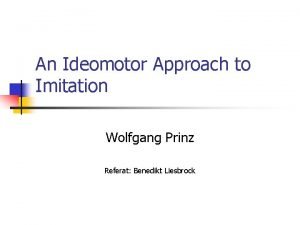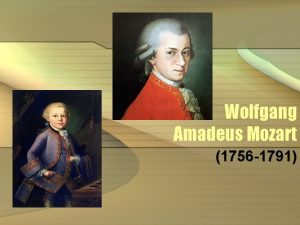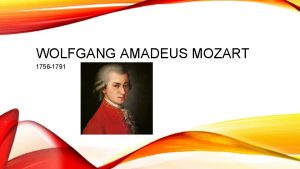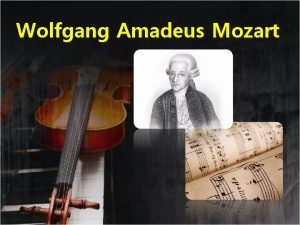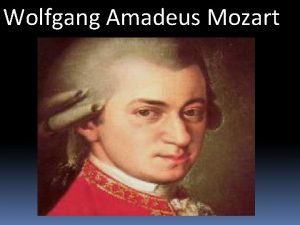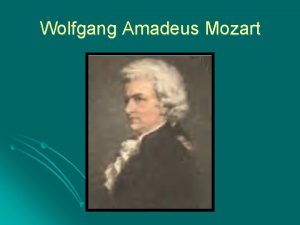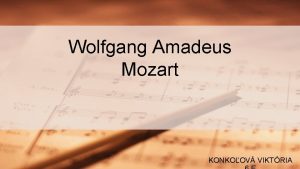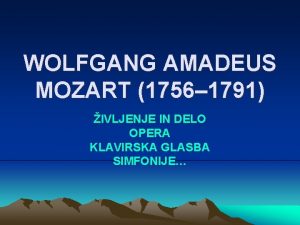Wolfgang Amadeus Mozart 1756 1791 Father Leopold Mozart














- Slides: 14

Wolfgang Amadeus Mozart 1756 -1791

• Father Leopold Mozart • Court musician • Composer • Wrote method on violin playing

• Leopold recognized Wolfgang’s genius, and devoted himself to educating the boy, and to exhibiting his accomplishments. • Traveled to France, England, Holland, Italy, Vienna, and principal cities of Germany

• Young Mozart was eager to learn all that he could from each place he visited. • His musical style was a combination of the best elements of each nationality’s musical identity

• By age 6 he was a virtuoso on keyboard. • Composed his first minuets at the keyboard • By age 9, wrote his first symphony • 11, first oratorio • 12, first opera

• His works are organized chronologically and cataloged with a K. number. • K is for Ludwig von Köchel, the researcher who compiled his works. • More than 600 works in the catalog.

• Absolute musicality - music for its own sake. No trace of Mozart’s personal troubles or disappointments in his music. He does not reveal his attitudes toward nature or the historical events of his time (the French Revolution is the most significant)

Composing • Composition came easy to Mozart. • Ideas were worked out thoroughly in his head first. • When it was time to write them down, he was just copying the finished product in his mind. • He would laugh and joke while copying

• Early symphonies showed Italian influence. • Later, he shows the influence of Haydn.

• Haydn’s themes appear to have been “invented with a view chiefly to their possibilities for motivic development. ” • Mozart’s themes usually are complete in themselves, and sometimes he rejects a formal development section in order to write a completely new theme.

• Mozart almost always has two contrasting ideas in his symphonies • Haydn often has one theme that is heard in two different keys for theme 1 and theme 2.

Freelancing • In 1781, Mozart decided against his father’s advice to quit his patronage job for the Archbishop of Salzburg. • Moved to Vienna to make it as a freelance musician. • Active as a pianist and composer. • “Popular” for about 5 seasons.

• Most of the works that made Mozart immortal were composed in the last ten years of his life. • Continued study of Haydn, and discovery of the music of J. S. Bach. • Bach’s influence gave Mozart more contrapuntal textures.

Vienna symphonies • Haffner Symphony (K. 385), Prague Symphony (K. 504) and Linz Symphony (K. 425) • Symphony in E flat (K. 543), Symphony in G Minor (K. 550), and Symphony in C Major (Jupiter) (K. 551) were written in a six week period in the summer of 1788.
 Wolfgang amadeus mozart (1756–91)
Wolfgang amadeus mozart (1756–91) Wolfgang amadeus mozart the favored one
Wolfgang amadeus mozart the favored one Composer born in salzburg
Composer born in salzburg Warum hatte wolfgang amadeus mozart geldprobleme
Warum hatte wolfgang amadeus mozart geldprobleme Wolfgang amadeus mozart
Wolfgang amadeus mozart He is the child prodigy and composer of requiem
He is the child prodigy and composer of requiem Mozart grave
Mozart grave Wolfgang amadeus mozart
Wolfgang amadeus mozart Wolfgang amadeus mozart
Wolfgang amadeus mozart Wolfgang amadeus mozart spitzname
Wolfgang amadeus mozart spitzname Wolfgang amadeus mozart death cause
Wolfgang amadeus mozart death cause Wolfgang amadeus mozart aussehen
Wolfgang amadeus mozart aussehen Volfgang amadeus mocart
Volfgang amadeus mocart Liesbrock
Liesbrock Wolfgang amadeus mozart was the only surviving
Wolfgang amadeus mozart was the only surviving
